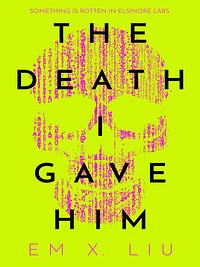You need to sign in or sign up before continuing.
Take a photo of a barcode or cover
I am always eager for Shakespeare retellings. For me, the great thing about Shakespeare's tales is that they are so easy to adapt to other settings. That being said, I might have seen this book a little differently if I didn't come at it expecting a Hamlet retelling. I admit I'm very picky about Shakespeare retellings, so I might have looked at this more critically than more casual readers. But even if this wasn't a Hamlet retelling, I would probably give it the same rating due to its lack of details.
I can understand that when someone is doing an adaptation or retelling, that changes are inevitably going to be made. It's just a little perplexing the choices this author made in their changes to the story. What makes Hamlet so great and lasting (in my opinion) is the tragedy of it all. How Hamlet's revenge and madness keeps driving him to more and more extremes, how even the "good" people end up suffering due to other characters' choices, how all the plotting and scheming and trying to keep power ultimately ends with a pile of bodies. In this book, two people die (except for Hayden's father, who is dead in the beginning). TWO PEOPLE. The author has this fantastic set-up of having all these conflicting personalities in a lockdown, where suspicions can grow, where claustrophobia can set in, where even the most rational people might go a little mad from being stuck indoors, and only TWO PEOPLE die. I also found it odd the choice in having some of the important characters not even show up on page, or do so very briefly. While they all aren't strictly necessary for the story, it was still weird not having them around. Like, why even bother trying to keep the mystery of who "she" is when the reader is coming in knowing this is a Hamlet retelling? Just include the mother from the start rather than pretend it's some kind of shocking reveal.
A problem with the book in general is how it's written and how little is described. I never got a great mental image of what the lab looked like, or what any of the characters looked like. I think Hayden was described in his intro, but for the life of me I can't remember if any of the others get any sort of description. And that includes Horatio. I just could not picture him at all or how he was supposed to work in the context of this story. I think he was supposed to be like SAM from Mass Effect Andromeda, which was a part of the Pathfinder but also was stored on the Ark, but I'm not sure. But if the complete lack of description wasn't bad enough, the choice in storytelling was just as bad, if not worse. The narrative kept jumping around to different styles, some of which took place after the fact (which completely ruins any sort of mystery or tension), and some of which are nothing but text. Again, absolutely no descriptions of anything. It's nearly impossible to connect with any of the characters outside of Hayden and Horatio, and even then those two could've been given more depth.
On the positive end, I will say that Hayden (Hamlet) was written decently. I liked that the author examined his mental health struggles. I think Felicia (Ophelia) was okay, too. Horatio was just odd. I have nothing against the author interpreting Hamlet and Horatio's relationship as romantic. If you want to ship them, that's fine. But please do so while fleshing out their characters more. Also, while the sex scene was interesting, it also took up like three full pages that could have been spent on something else.
As I said, if this wasn't a retelling, I still would've found it lacking. But since it was, I judged it a lot harsher.
I can understand that when someone is doing an adaptation or retelling, that changes are inevitably going to be made. It's just a little perplexing the choices this author made in their changes to the story. What makes Hamlet so great and lasting (in my opinion) is the tragedy of it all. How Hamlet's revenge and madness keeps driving him to more and more extremes, how even the "good" people end up suffering due to other characters' choices, how all the plotting and scheming and trying to keep power ultimately ends with a pile of bodies. In this book, two people die (except for Hayden's father, who is dead in the beginning). TWO PEOPLE. The author has this fantastic set-up of having all these conflicting personalities in a lockdown, where suspicions can grow, where claustrophobia can set in, where even the most rational people might go a little mad from being stuck indoors, and only TWO PEOPLE die. I also found it odd the choice in having some of the important characters not even show up on page, or do so very briefly. While they all aren't strictly necessary for the story, it was still weird not having them around. Like, why even bother trying to keep the mystery of who "she" is when the reader is coming in knowing this is a Hamlet retelling? Just include the mother from the start rather than pretend it's some kind of shocking reveal.
A problem with the book in general is how it's written and how little is described. I never got a great mental image of what the lab looked like, or what any of the characters looked like. I think Hayden was described in his intro, but for the life of me I can't remember if any of the others get any sort of description. And that includes Horatio. I just could not picture him at all or how he was supposed to work in the context of this story. I think he was supposed to be like SAM from Mass Effect Andromeda, which was a part of the Pathfinder but also was stored on the Ark, but I'm not sure. But if the complete lack of description wasn't bad enough, the choice in storytelling was just as bad, if not worse. The narrative kept jumping around to different styles, some of which took place after the fact (which completely ruins any sort of mystery or tension), and some of which are nothing but text. Again, absolutely no descriptions of anything. It's nearly impossible to connect with any of the characters outside of Hayden and Horatio, and even then those two could've been given more depth.
On the positive end, I will say that Hayden (Hamlet) was written decently. I liked that the author examined his mental health struggles. I think Felicia (Ophelia) was okay, too. Horatio was just odd. I have nothing against the author interpreting Hamlet and Horatio's relationship as romantic. If you want to ship them, that's fine. But please do so while fleshing out their characters more. Also, while the sex scene was interesting, it also took up like three full pages that could have been spent on something else.
As I said, if this wasn't a retelling, I still would've found it lacking. But since it was, I judged it a lot harsher.
dark
mysterious
tense
medium-paced
Plot or Character Driven:
Plot
Strong character development:
Complicated
Loveable characters:
No
Diverse cast of characters:
Yes
Flaws of characters a main focus:
Yes
I was anticipating this when it first released, but I just don’t care about any of the characters or the mystery.
this was such an interesting read i loved the premise and i loved that it was written like a historical account getting small pieces of the story from every character and shifting between 1st person and 3rd to adding transcripts. made me want to read shakespeare just to fully grasp all the nuances of the story. -1 bc i personally didnt like the romantic relationship (if you can call it that) it made me feel weird. would recommend if you want a small scale sci fi book w interesting family dynamics
dark
reflective
tense
medium-paced
Plot or Character Driven:
A mix
Strong character development:
Yes
Loveable characters:
No
Diverse cast of characters:
Yes
Flaws of characters a main focus:
Yes
When the Ophelia character said she wanted to kill the Hamlet character , I was turned off
challenging
dark
emotional
reflective
medium-paced
The idea of a hard science fiction Hamlet retelling intrigued me. That being said, I’ve never read Hamlet and I didn’t feel like reading it before I read this story. Hayden Lichfield's life is ripped apart when he finds his father murdered in their lab, and the camera logs erased. The killer can only have been after one thing: the Sisyphus Formula the two of them developed together, which might one day reverse death itself. Hayden has no idea who the killer might be: his Uncle Charles, head of security Paul Xia, lab tech Rasmussen, or Paul’s daughter and Hayden’s coworker and ex-girlfriend Felicia. What transpires is a story of Hayden and Horatio’s relationship together and to an extent Hayden and Felicia’s too. Liu’s main gaze looks at a thoroughly intimate integration of Horatio into Hayden’s neurological network and just how a sentient AI might behave in a situation. While initially pitched as a locked room mystery retelling of Hamlet, this story quickly begins to get away from that original premise and introduce some interesting themes and ideas. It stops being a locked room murder mystery and instead rips into revenge, relationships and romance. The narrative is a jagged mix of Horatio observing Hayden, extracts from Felicia Xiu and an editor piecing everything together to preserve the story of what went down in Elsinore Labs. As such, we find out who the killer is a little too quickly for comfort. No song and dance, no sleight of hand. We just know who it is and move along. With that, the payload has been dropped and all that remains is blood. There are moments of excellence. When Hayden enacts his plan to avenge his father’s death it is a true masterstroke. That moment when you say “No!” out loud as you see what’s about to happen but you, and the characters, are powerless to do anything about it. The juxtaposition of the sterile lab environment with the ugly, butcher’s shop violence was effortlessly done and was satisfyingly unsettling. I enjoyed the parts I enjoyed but subsequent scenes of violence, killing, and self harm also weren’t executed in a way I found satisfying for the narrative, and as such I lost my way with Hayden’s motivations and his character. What this book does best is look at some interesting ethical questions under a science fiction scalpel. Should our relationship with AI really cross this line of direct interfacing? Is the fear of death worth killing for? Do we really have the right to try and live forever? While all these interesting questions are explored, I do feel like I wasn’t given satisfying answers or a way to finish the story with a great takeaway. Not exactly the book that I wanted, but not worthy of a DNF either. Definitely a book I plan to reread another day and re-examine.
challenging
dark
sad
tense
medium-paced
Plot or Character Driven:
Plot
Strong character development:
Complicated
Loveable characters:
No
Diverse cast of characters:
Complicated
Flaws of characters a main focus:
Yes
I loved the first approx 60% and then the rest got a bit repetitive and I started eyerolling. Was hoping the ending would redeem itself, but....
I did like the stem 'retelling' though.
I did like the stem 'retelling' though.
slow-paced
Loveable characters:
No
Diverse cast of characters:
Yes







